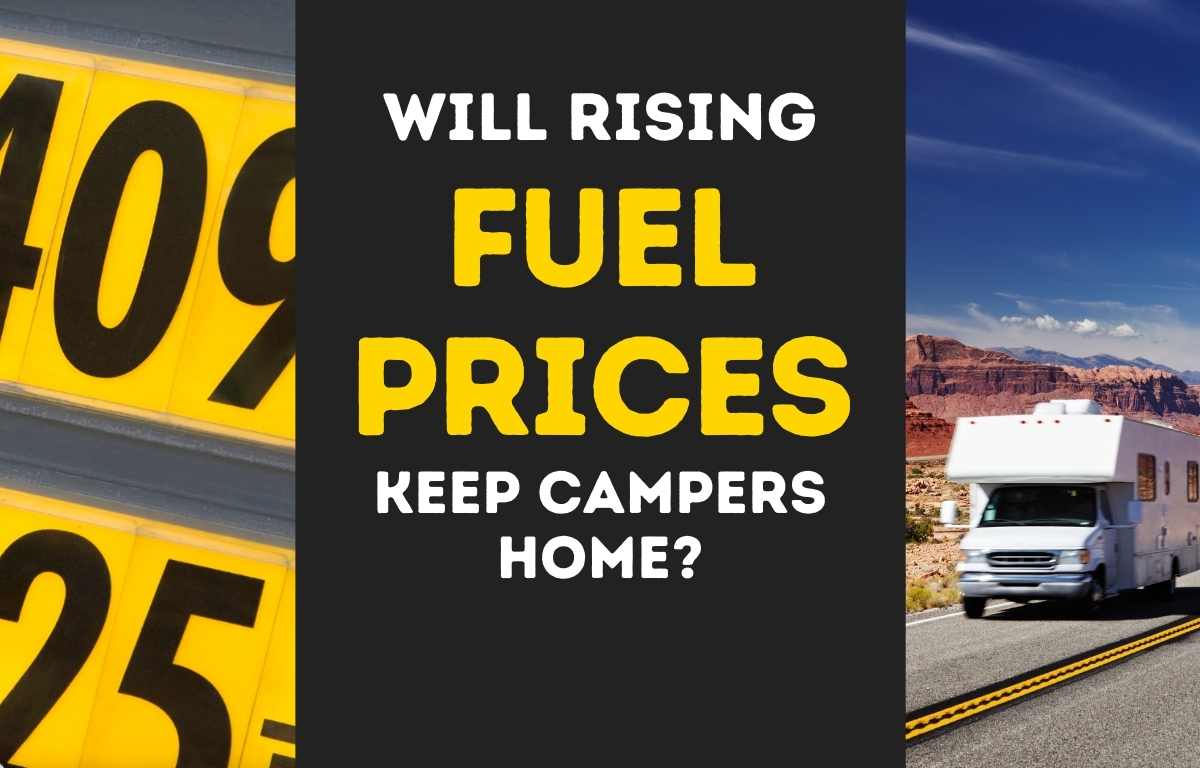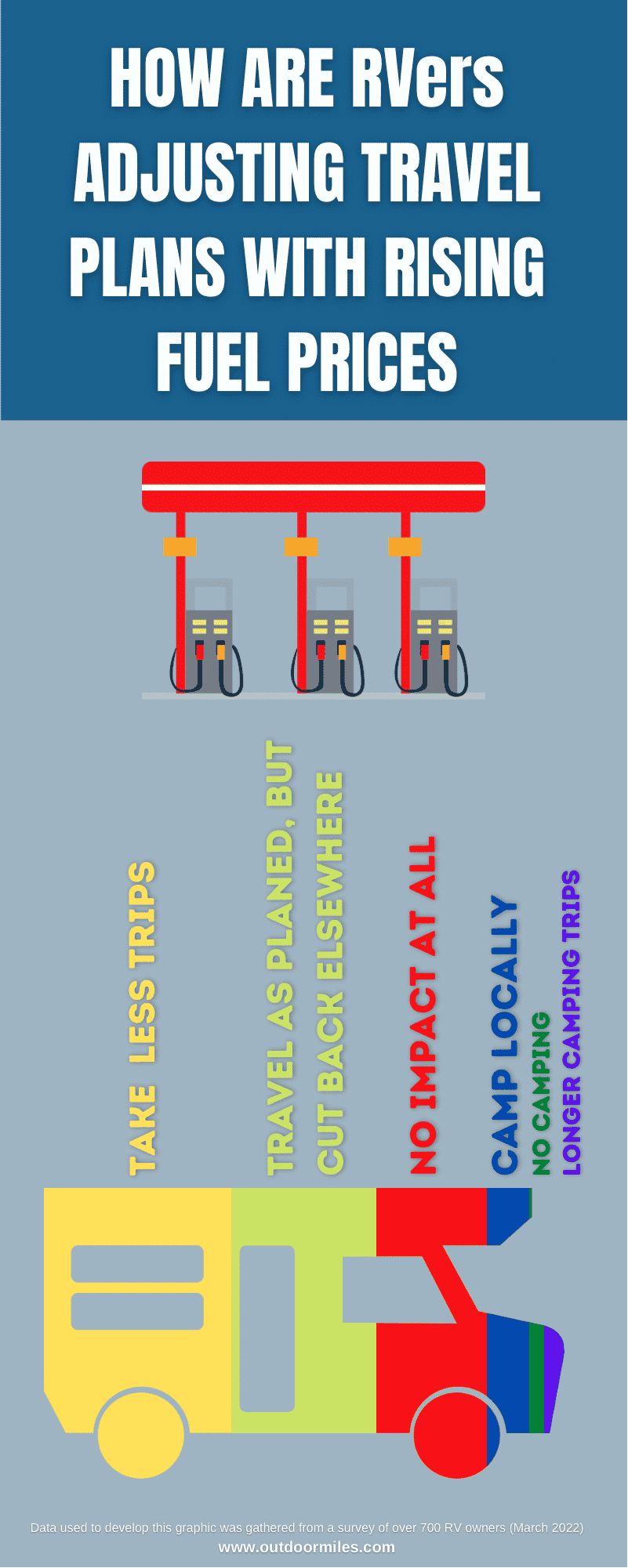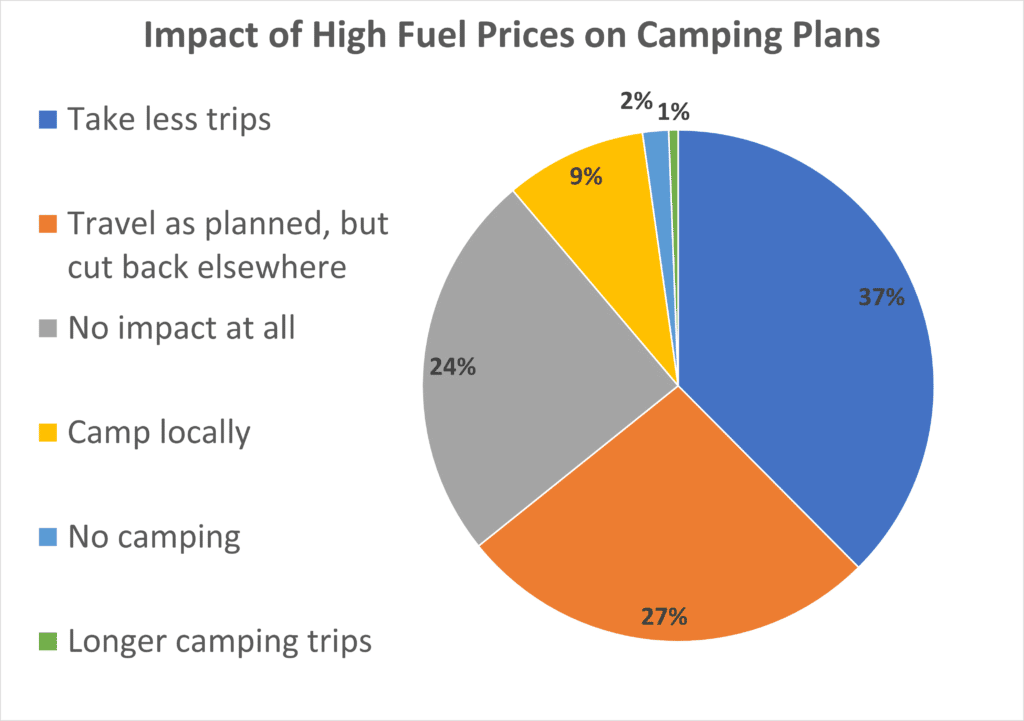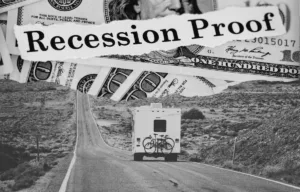High gas prices will impact travel for 75% of RV owners this coming year.
It seems like every news outlet is full of articles about high gas prices. Nothing can grab the attention of the everyday consumer like an increased cost at the pump. This issue hits home for so many people due to its immediate impact on our daily lives. When you pull up to the pump and watch the price ticker climb as you fill your tank, it’s easy to see just how much more money is coming out of your wallet.

The gas price issue is front and center for the RV community. It will likely impact travel plans for many campers this summer. Traveling via RV is expensive, and with every increase in the cost of a gallon of fuel, that expense increases. RVs and tow vehicles are anything but fuel-efficient. Large Class A motorhomes may get as little as 5-7 miles per gallon. If prices reach $5.00/gallon, which is a very likely scenario in the near future, traveling by RV will cost upwards of $1.00 per mile for some. That 3,000 cross-country road trip just got a whole lot more expensive.
Even for more fuel-efficient RVs and tow vehicles, the cost of moving a home-on-wheels is expensive. Few can achieve better than 15 miles per gallon on an average trip. With high gas and diesel prices, the enemy to travel is distance. As a result, vacation and travel budgets will look a lot different this year for many more people.
It’s hard to imagine a scenario where this doesn’t have a ripple effect on other segments of the economy. Americans have a finite amount of disposable cash, so if RVers need to dedicate more of it to fuel, less will be available for other traditional travel expenses like eating out at restaurants, visiting local attractions, or splurging on non-essentials.
The RV industry has had a wild ride over the past few years. Covid restrictions for traditional travel forced people to look for alternatives, and the RV and camping lifestyle was there to answer the call. Between 2020 and 2021, more than 1 million new RV owners entered the lifestyle. As a result, the RV and camping industry has experienced unsurpassed pressure on them over the past two years. Dealer inventories are more than 40% below “normal.” As a result, the major manufacturers have billions of dollars in backorders, and wait times for new RVs are unprecedented, with some people waiting over a year to take ownership.

Survey Results
While it’s easy to speculate how the rising fuel costs will impact the RV community, we decided to ask them. So, in an unofficial poll of RV owners via social media groups, we posed the question: “How will high gas prices impact your camping plans this season?” Well, it didn’t take long to get responses. Nearly 700 RVers shared their thoughts in less than a few hours.
Although we’re early in the reality of high fuel prices and anything can change, the responses from the RV community were surprising. If we look at the entirety of responses, it’s clear that the high fuel prices will impact travel plans for most RVers in some capacity. What that impact looks like varies, but RVers are making adjustments to their plans.
Although 50% of RV owners responded that rising fuel prices wouldn’t limit their travel distance, most will look to offset these costs by finding ways to cut back elsewhere to afford their camping lifestyle. As a result, the ancillary industries may see a drop in business from campers as they opt to cut costs elsewhere. Only 25% of the camping community stated that the high prices wouldn’t impact their plans at all, and they’d travel and spend as they would if prices didn’t rise.
However, an almost equal number of campers indicated adjusting their plans significantly. 47% of respondents stated that they will still travel but do less of it or stay local. Assuming a typical RV owner camps for two weeks out of the year, if some campers cut back to half that time, the impact will surely be felt by the RV industry and related businesses. With the recent interest in the camping lifestyle, this blow may be partially softened by the influx of new campers, but the wave the industry has been riding may slow to more of a ripple.
10% of campers stated that they are still planning to take the same number of trips but stay closer to home. This change may have a greater impact on the communities that rely heavily on tourism, like tourist towns surrounding National Parks, popular beach towns, and campgrounds that cater to the road tripper. It’s hard to say for sure, but local campgrounds that are traditionally easier to make reservations at may see an uptick in bookings as campers decide to stay closer to home.

If there is one glimmer of home for the RV industry, it’s that very few respondents stated that they’d give up their camping plans altogether. Less than 2% of campers will be staying home this year. Others have stated that they’ll take longer trips vs. several shorter ones. Finally, some folks stated that they’d camp as planned but do a lot more complaining about gas prices.
The full effects of the high fuel prices are yet to be seen. Will there be a decline in RV orders? Will truck prices drop from their record highs? Will we see an increased call for electric tow vehicles and RVs? Only time will tell. One thing is certain- if prices continue to climb above even the most conservative predictions, the impact on the camping industry will continue to increase.
- Latest Statistics and Trends for the RV Industry, RV lifestyle, and Camping (2023)One day I was sitting at my campsite, looking at all the Recreational Vehicles (RVs) and doing some quick math in my head, trying to figure out how much money in RVs was surrounding me. It was a lot. I know this doesn’t sound like an exciting way to spend my camping time, but the … Read more
- When A Recession Hits, Americans Go CampingWhen browsing the latest news headlines, it’s nearly impossible to avoid reading about a possible recession in 2023. As companies prepare for a temporary downturn in business, others look to historical data to predict how their industry will fair. While no industry can be completely recession-proof, some will make it through unscathed, while others will … Read more
- How Much More Will You Spend in Gas this Year for Your RV (2022)?There’s no question that the higher gas prices are putting a strain on everyone’s wallets. It’s one of the most noticeable increases in people’s monthly expenses. It’s easy to notice the higher gas prices while you stand at the pump, watching the price ticker climb as we fill the tank. Without question, it’s easy to … Read more




To Tom Davidock – Obviously you are part of the “Doom & Gloom” journalist with this article. I know, bad news sells – good news does not. Although, your article is a good summary of your sample survey, it is presented as “Bad News” with the headlines that “High gas prices will impact 75% of RV owners”. Would in not been just as interesting to open with “Only 2% of RV Owners say fuel prices will keep them at home”. 73% say they will take shorter trips and stay longer, while 25% say fuel prices will have no effect on plans.
Would not have the sensationalism as your way but would change it to a feel good article and better represent your readers and lifestyle they enjoy as well as the industry you say you serve.
Thanks for the comment and for sharing your perspective. While the headline wasn’t meant to be negative, I can see how it can appear that way. However, I do believe that it captures the sentiment of the majority RVers who are planning to modify their travel plans to align with the additional expenses they’ll incur with higher fuel prices. Based on the comments and chatter within social media groups, I was actually expecting to see a more drastic shift to less travel. Trust me, I am very happy to see that not happen. As it stands now, I think that the impact will primarily be a shift towards closer trips, longer stays, and more belt-tightening of travel budgets. The impact of that will be dampened by the historic highs of the number of campers on the road today, but the overall impact on the camping and ancillary industries will be something that I believe will be measurable.
Since RVing is such a fuel-heavy form of transportation, I do think that the higher prices at the pump will hit this group harder than others. A vacation by car may cost an extra $50-$100 for a 400-mile trip, while the same distance for an RVer may cost an extra $150-$300. That’s enough of a difference to cause people to modify their travel plans. From the survey, most folks will make some adjustments to cover those extra expenses. thankfully, for now, that doesn’t include staying home.
I sold my Jayco Pop Up Truck Camper. It literally halved my 2006 Tundra’s gasoline mileage. Now I just drive my fuel efficient Toyota Auto & stay in Motels, eat in Restaurants. A lot less hassles. I just have to travel on May/June & Sept/ Oct. No problems & a lot less hassles than an RV.